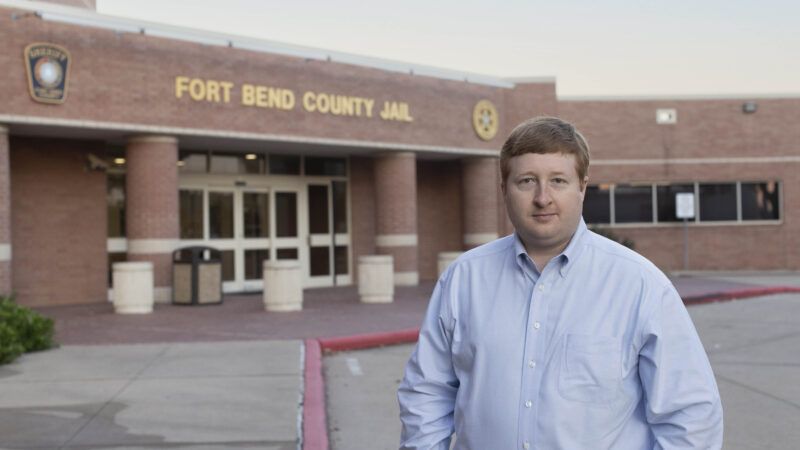This Journalist Was Arrested, Strip-Searched, and Jailed for Filming Police. Will He Get Justice?
Justin Pulliam's arrest and lawsuit once again demand we ask if "real" journalists are entitled to a different set of rights.

Prosecutors in Texas last week dismissed the criminal case against a journalist who, in 2021, was arrested, strip-searched, and jailed for filming police. But his lengthy legal battle is in some sense just beginning and once again demands we probe the idea that real journalists are entitled to a different set of rights than the public.
That's because Justin Pulliam, the man in question, is a citizen journalist. He is not employed by an outlet. Rather, he publishes his reporting to his YouTube channel, Corruption Report, which, true to its name, is unapologetically skeptical of state power and supportive of transparency.
The Fort Bend County Sheriff's Office (FBSCO) has allegedly been vexed by his audacity. In July 2021, Pulliam was expelled by police from a press conference because they alleged he did not qualify as media, and in December of that same year, he was arrested for videoing police at a mental health call, despite that he had stationed himself about 130 feet away from the interaction. Officer Taylor Rollins demanded Pulliam move back even further, and he obliged, although he continued to film the deputy speaking to other bystanders at the scene (none of whom were arrested).
That didn't end well for Pulliam, who was charged with interfering with police duties. (According to his complaint, Officer Ricky Rodriguez, who assisted with the arrest, told another cop at the jail that the ordeal would teach Pulliam a lesson "for fucking with us.") In April 2023, a jury was not able to reach a verdict in the case, with five jurors wanting to acquit and one urging to convict. It took law enforcement more than a year to decide not to pursue the case further.
One wonders if the Fort Bend government is smartly allocating resources in support of public safety when it doggedly went after a case because someone filmed them. Yet at a deeper level, it's worth asking if law enforcement would have taken the case to trial at all had Pulliam worked for a formal media outlet. My guess is no.
It is difficult to reconcile those two things. Journalism is, after all, an activity, consisting of collecting information and reporting it to the public. That venture is not exclusively available to people working at a full-time newsgathering organization, and the strength of the First Amendment should not hinge on whether or not you are on a media outlet's payroll. Even if Pulliam didn't consider himself a journalist at all—citizen or otherwise—his right to film the government employees he pays with his taxes should remain intact. It certainly shouldn't come at the expense of his freedom.
Whether or not he will be able to make that case before a jury in civil court is yet to be determined. Last June, Judge David Hittner of the U.S. District Court for the Southern District of Texas allowed Pulliam's federal lawsuit to proceed, declining to award the defendants qualified immunity, the legal doctrine that shields state and local government actors from such claims if their alleged misconduct was not already "clearly established" in the law.
"The Individual Defendants assert no case law to support their proposition that an indictment precludes a claim for first amendment infringement," wrote Hittner. "Indeed, based on the facts alleged in the complaint, it appears Pulliam was singled out and arrested for exercising his rights under the First Amendment."
Pulliam, however, is not in the clear. He will next have to convince the U.S. Court of Appeals for the 5th Circuit, which has considered a similar case in recent months: that of Priscilla Villarreal, the citizen journalist in Laredo, Texas, who police arrested in 2017 using an obscure statute criminalizing the solicitation of nonpublic information if there is the "intent to obtain a benefit." If that description sounds a lot like standard journalism—seeking information not yet public—that's because it is. But despite attracting some strange bedfellows in her defense, Villarreal has not fared well in court.
While her case is not identical to Pulliam's, they both raise very similar questions, particularly as it relates to the idea that a certain class of journalists should get more rights than others. "Villarreal and others portray her as a martyr for the sake of journalism," wrote Judge Edith Jones in her majority opinion dismissing Villarreal's suit and giving qualified immunity to the police. "That is inappropriate," according to Jones, because Villarreal, who posts her reporting to her popular Facebook page Lagordiloca, is not a "mainstream, legitimate media outlet." Her free speech rights are suffering as a result.
Show Comments (58)